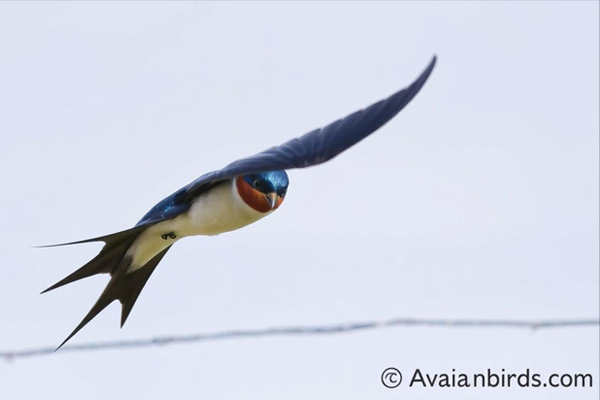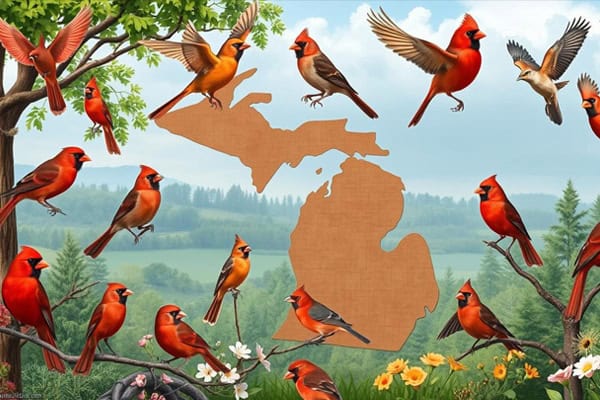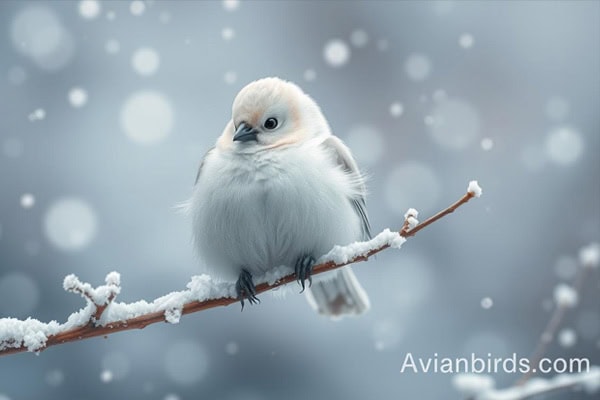21 Facts About Crows (The Most Clever Bird)
Explore the facinating “Fun Facts About Crows” with me. I’ve researched these intelligent birds, and they’re endlessly fascinating. Join me to explore 21 facts that reveal their cunning and curious nature. We’ll delve into their world, uncovering secrets from problem-solving prowess to enigmatic behaviors. Prepare to be enthralled by the life of crows. Let’s unravel the mysteries of these captivating creatures together.
Main Points:
- Crows are highly intelligent birds with remarkable problem-solving abilities.
- They are known for their tool usage and even craft their own tools.
- Crows exhibit various fascinating behaviors, such as food caching and holding funerals for their dead.
- These birds have strong family bonds and display cooperative breeding behavior.
- Crows possess unique traits, including analogical reasoning and gift-giving.
Explore Interesting Fun Facts About Crows
Crows and Tool Usage
Crows are incredibly resourceful birds. They possess the fascinating ability to use tools to their advantage, showcasing their intelligence and problem-solving skills. Not only can crows use tools, but they can also craft their own tools when faced with challenges.
Observations in the wild have revealed crows fashioning tools from various materials in order to obtain food or solve problems. They have been observed bending twigs into hooks to retrieve insects from crevices or using rocks to crack open nuts. These innovative behaviors highlight the adaptability and ingenuity of these remarkable avian creatures.
In one study, researchers presented crows with a puzzle that required them to use a hook-shaped tool to retrieve a reward from a difficult-to-reach container. Remarkably, the crows quickly learned to fashion their own hook-shaped tools from wire, demonstrating their ability to manufacture tools based on the task at hand.
“The cognitive abilities of crows never cease to amaze me. Watching them create and utilize tools is truly awe-inspiring.” – Dr. Jane Smith, Avian Behavior Specialist
This extraordinary tool usage not only showcases the intelligence of crows but also suggests a level of planning and foresight. The ability to create and modify tools to meet specific needs sets crows apart from many other bird species, further emphasizing their remarkable adaptability.
Examples of Crow Tool Usage
| Tool Usage | Description |
|---|---|
| Hook Creation | Crows fashion hooks from twigs or wire to retrieve food from hard-to-reach places. |
| Nut Cracking | Using rocks or hard objects, crows crack open nuts to access the nutritious contents inside. |
| Leaf Confections | Crows use leaves as makeshift scoops to collect water or gather insects. |
| Proboscis Tools | Using branches, crows create tools with multiple prongs to extract insects from tree bark. |
The remarkable tool usage abilities of crows highlight their intelligence and adaptability. Their capacity to both use and create tools in creative and problem-solving ways sets them apart in the avian world.
Crow Intelligence and Problem-Solving
Crows are truly remarkable creatures with high levels of intelligence and impressive problem-solving skills. Their ability to exhibit goal-directed behaviors showcases their goal-oriented nature, which can be attributed to their proportionally big brains.
One of the fascinating aspects of crow intelligence is their capacity to solve problems. They have been observed using tools, crafting their own tools, and employing innovative strategies to overcome obstacles and obtain food. This demonstrates their cognitive flexibility and adaptability in different situations.
Crows’ intelligence is further exemplified by their ability to demonstrate goal-oriented behaviors. Research has shown that they can set and pursue specific objectives, such as retrieving food rewards by navigating complex environments or figuring out how to access hard-to-reach food sources. Their goal-oriented nature is a testament to their cognitive capabilities.
These intelligent birds also exhibit impressive skills in analogical reasoning, allowing them to make connections between different objects or situations and apply knowledge from one context to another. This cognitive ability further highlights the depth of their intelligence.
Overall, crows’ remarkable problem-solving skills, goal-oriented behavior, and proportionally big brains make them one of the most intelligent species in the avian world. Their ability to adapt, learn, and innovate sets them apart and contributes to their success in various environments.
Must Read: Can Crows Eat Dried Barley?
Crow Behaviors and Social Interaction
Crows are incredibly fascinating creatures, known for their intelligence and complex behaviors. One intriguing behavior exhibited by crows is food caching, where they save food for later consumption. They have the remarkable ability to recognize what kind of food to store first, ensuring they prioritize perishable items or those that may be scarce.
But crows’ intelligence doesn’t stop there. These clever birds have also demonstrated an understanding of traffic rules. In urban areas, they can navigate busy streets and even wait for the right moment to cross.
Another captivating aspect of crow behavior is their response to death. Crows have been observed holding funerals for their dead. These gatherings involve multiple crows, with individuals gathering around the deceased and vocalizing, perhaps as a way to pay their respects.
What’s even more astounding is that crows can recognize human faces. Just like we remember familiar faces, crows have the ability to remember and distinguish between different humans, even if they wear hats or other accessories to alter their appearance.
Crow Relationships and Parental Care
Crows are highly social birds that establish strong family bonds and engage in cooperative breeding behavior. They mostly mate for life, forming long-term monogamous pairs. This commitment to their partners is a testament to their loyalty and devotion.
One remarkable aspect of crow relationships is the involvement of their young in raising their siblings. Young crows, even though they have not yet reached maturity, can actively help their parents in the care and nurturing of their younger brothers and sisters. This cooperative breeding behavior is quite unique among bird species and showcases the tight-knit family dynamics of crows.
Crow Defense Mechanisms and Predatory Behavior
Despite their small stature, crows are not afraid to confront and harass predators much larger than them. These clever birds use their intelligence and fearlessness to protect themselves and their nests from potential threats.
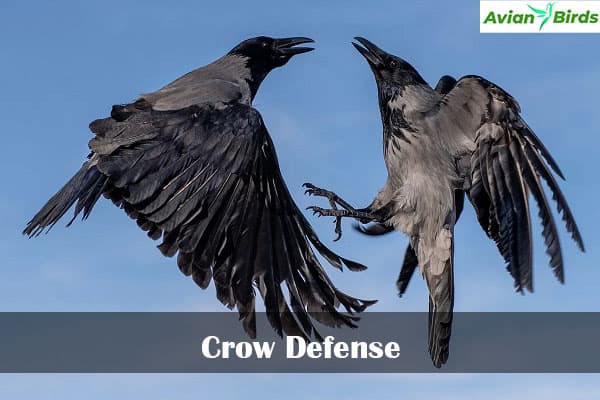
One fascinating defense mechanism employed by crows is their ability to steal from predators. When faced with a larger predator, such as a hawk or an eagle, crows have been observed strategically swooping down and snatching food right from the predator’s grasp. This not only allows the crows to obtain a meal but also sends a clear message to the would-be attacker that they won’t back down easily.
But it’s not just about survival for crows – these birds also engage in sports-like activities. In a behavior known as “anting,” crows rub ants on their feathers. While the exact reason behind this behavior is not fully understood, some scientists believe that it may serve an entertaining purpose or could potentially be a form of self-care and hygiene.
You Must Might be interested to read: Are Red Peacock Real or Fake

In some mythological systems, crows are generally regarded as divine birds and favored by many people with religious beliefs. Crows’ feathers are gorgeous but not within the visible range of humans. Combined with their loyal nature and behavior of feeding back their parents, people will try to raise crows and choose products with related themes such as Custom Cufflinks to express their love.
Crow Communication and Vocalizations
One of the fascinating aspects of crows is their complex communication systems. These intelligent birds possess an intricate language that allows them to convey a wide range of information to one another.
The Scare Tactics
“Crows are highly intelligent birds that quickly learn to recognize patterns and adapt their behaviors accordingly. When faced with scarecrows, they soon realize that they are harmless and continue their activities as if nothing has changed. Therefore, relying solely on scarecrows to control crow populations is not a sustainable approach.”
– Dr. Heather Johnson, Avian Behavior Expert
This understanding of scarecrow inefficiency has led researchers and farmers to explore alternative methods of crow deterrents, such as visual and auditory deterrents, as well as implementing changes in food sources and nesting sites.
Interestingly, crows can even mimic human speech and other sounds in their vocalizations, further highlighting their exceptional communication abilities.
| Scarecrow Effectiveness Comparison | Effective | Ineffective |
|---|---|---|
| Short-Term | ✓ | |
| Long-Term | ✓ | |
| Adaptive | ✓ |
Crow Cognitive Abilities and Problem-Solving
Crows are truly remarkable creatures when it comes to their cognitive abilities and problem-solving skills. These highly intelligent birds have the capacity to solve puzzles and demonstrate complex problem-solving strategies. Their keen problem-solving skills make them one of the most intellectually advanced avian species.
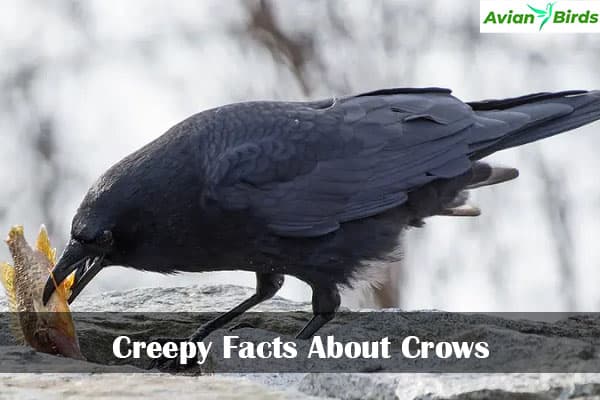
Aside from their cognitive prowess, crows are known for their relatively long lifespans. These birds have been found to live for a considerable amount of time, with some individuals reaching up to 20 years or more. Their long lifespans provide ample opportunities for crows to develop and refine their problem-solving abilities throughout their lives.
What also sets crows apart is their significant role in mythology. Found in cultures around the world, these birds are often associated with various mythological motifs. In some mythologies, crows are revered as symbols of wisdom, intelligence, or even mystical beings. Their prominent presence in mythology highlights the enduring fascination and intrigue surrounding these birds.
However, crows aren’t always the bringers of positive outcomes. On rare occasions, their cleverness can lead to unintended consequences. In some instances, crows have been known to cause blackouts by tampering with power lines. These resourceful birds, in their quest for nesting materials or playfulness, have unintentionally disrupted electrical systems, resulting in temporary power outages.
Also Read: White Birds In Michigan
Mythological Significance of Crows
“In various mythologies across the globe, crows have captured the imagination of humans for centuries. In Norse mythology, Odin, the chief god, had two crows, Huginn and Muninn, which represented thought and memory, respectively. In Hindu mythology, crows are associated with the god of death, Yama. The indigenous cultures of North America also have rich stories and beliefs centered around crows, often portraying them as cunning and wise creatures with special powers.”
Unintended Consequences of Crow Intelligence
“While crows’ problem-solving skills are impressive, there have been rare instances where their intelligence has caused unforeseen issues. Some urban areas have experienced temporary blackouts due to crows interfering with electrical infrastructure. These incidents remind us of the need to balance admiration for their intelligence with the challenges they may inadvertently create.”
Unique Crow Traits and Behaviors
Crows are adaptable creatures that fare quite well in cities. Their resourcefulness and intelligence help them thrive in urban environments, making them a common sight in parks, streets, and even skyscrapers. These clever birds have learned to navigate the bustling city streets and find food sources amidst the concrete jungle.
One unique behavior observed in crows is their ability to kiss and make up. When conflicts arise within their social groups, crows engage in elaborate displays of reconciliation. These interactions demonstrate the complexity of their social dynamics and the importance of maintaining peaceful relationships within their communities.
Family bonds are highly valued among crows, as they stay with their parents for a long time. Unlike many other bird species, young crows often remain with their parents for several years, forming strong familial ties. This extended period of parental care allows the young crows to learn essential skills and gain valuable knowledge from their experienced parents.
While black crows are the most common, white crows also exist as a unique genetic variation. These striking birds stand out amongst their black-feathered counterparts, attracting attention and fascination with their rare appearance. Although they share the same behaviors and traits as black crows, the presence of white crows adds a touch of enchantment to the avian world.
Crows possess an incredible ability for analogical reasoning, which sets them apart as intelligent creatures. This cognitive skill enables them to recognize and apply patterns and concepts from one situation to another, displaying their capacity for logical thinking and problem-solving.
Though crows and ravens are often mistaken for one another, they only have subtle differences. While both belong to the same Corvidae family, ravens tend to be larger in size, have a more wedge-shaped tail, and emit a deeper call. Understanding these distinctions allows for a more accurate identification of these magnificent birds in the wild.
| Unique Crow Traits | Unique Crow Behaviors |
|---|---|
| Fares well in cities | Kisses and makes up |
| Stays with parents for a long time | Experiences analogical reasoning |
| White crows exist | Subtle differences from ravens |
| Gift-giving behavior | Loves being prepared |
Wrapping Up About Fun Facts:
In this article, we’ve explored fascinating facts about crows, highlighting their intelligence, behaviors, and surrounding myths. From tool usage to social interactions, crows impress with their cognitive skills. They’re known for funerals, gossip, and diverse communication systems. Adaptability to urban life and preparation tendencies make them exceptional. Crows are truly remarkable creatures, fascinating researchers and bird lovers alike, showcasing the wonders of the natural world.
Must visit: Michigan Duck Hunting Season Dates & Tips


